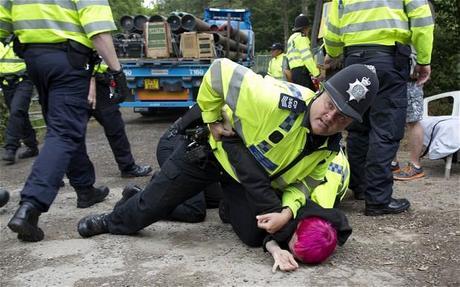
by Damian Carrington / The Guardian
The environment secretary, Owen Paterson, convened an urgent high-level meeting for the boss of fracking company Cuadrilla after a disagreement over shale gas regulation, the Guardian can reveal.
Cuadrilla’s chairman, Lord Browne, had already met the Environment Agency’s chair, Lord Chris Smith, at least three times to dispute whether regulations covering drilling waste applied to the company’s operations. At the meeting Paterson organised at Browne’s request, Smith offered to halve the consultation time for a waste permit, agreed to intervene with a county council over Cuadrilla’s planning permission and to identify further risks to Cuadrilla’s plans.
The disclosures show a conflict of interest between Browne’s positions as both the government’s lead non-executive director and the chair of Cuadrilla, according to Green party MP, Caroline Lucas: “These revelations are extremely disturbing and it certainly looks like there is a conflict of interest between Lord Browne’s government and commercial positions.”
Lucas, a member of the environmental audit committee of MPs, is also concerned by the Environment Agency’s approach in the meeting: “That is even more worrying and seems at odds with its responsibilities to protect the environment and to ensure that people have their say on fracking.” Lucas is set to appear alongside other anti-fracking campaigners at Brighton magistrates court on Monday to face charges arising from the anti-Cuadrilla protest in Balcombe, Sussex, in August 2013.
A spokesman for Browne, the former chief executive of BP, said: “We welcome the fact ministers have listened to the views of a range of stakeholders, including Cuadrilla. Any meetings that Lord Browne has had on this issue have taken place in his capacity as chairman of Cuadrilla in an appropriate way, with officials present, and on the same basis as others have meetings with ministers and officials.”
In January, the Guardian revealed that shale gas executives and government officials collaborated in private to manage the British public’s hostility to fracking. Paterson, widely considered a climate change sceptic, said recently: “I would like to see shale gas exploited all over rural parts of the UK. The opportunities here are enormous.”
Documents released under freedom of information (FoI) rules show that on 3 June 2013 Browne, having met Smith earlier that day, then wrote to Paterson requesting an “urgent meeting”. The subject, Browne said, was “Cuadrilla Resources applications to the Environment Agency (EA) for environmental permits required to progress the company’s proposed shale gas exploratory activities. This is an application process that has been ongoing for the best part of a year.”
Browne quickly followed up with a phonecall to Paterson and within seven days, Paterson hosted a teleconference with Browne and Cuadrilla chief executive Francis Egan, Smith, energy minister Michael Fallon and the government’s lead shale gas official. In contrast, two leading renewable energy industry figures have told the Guardian their meetings with Fallon have been repeatedly postponed.
The teleconference discussed “concerns at the [European commission] decision that permits are now being required under the requirements of the mining waste directive”, given that Cuadrilla’s planning permission in Balcombe was due to run out within three months. Smith offered “a shortened two-week consultation process prior to determining permits”, rather than the usual four weeks. However, Cuadrilla baulked at the offer on the basis that “a four-week consultation [would] minimise the risks of legal challenge”. The EA redacted this section when it released the meeting minutes under FoI rules, but Paterson’s department did not redact it in responding to a separate FoI request.
The EA promised to see “what can be done to simplify the application process further” and also offered to engage with West Sussex county council on extending Cuadrilla’s planning permission, which was due to expire. The “next steps” agreed included: “The EA will do some additional horizon-scanning for additional risks.” The meeting also warned of the “risk of new regulation from the EU”, which the UK finally saw off in January.
Greenpeace UK energy campaigner, Lawrence Carter, said: “The EA is supposed to act as a watchdog to protect our countryside from the impact of fracking, yet they seem to be all too willing to listen to the special pleading of Lord Browne and Cuadrilla. These documents reveal that officials are doing everything they can to facilitate Cuadrilla’s plans, to a point that makes even the company feel uneasy.”
Andy Rowell, co-author of a new book A Quiet Word: Lobbying, Crony Capitalism and Broken Politics in Britain, said: “This is exactly how lobbying works. It is the classic ‘quiet word’ that David Cameron warned about [in 2010]. If Lord Browne is advising the government he should not be allowed to lobby it for commercial gain too: there is a clear conflict of interest there.”
A spokeswoman for the Department of Environment, Food and Rural Affairs said: “We have been successfully regulating gas and oil drilling for over 50 years. It is not unusual for ministers to meet with senior representatives from companies managing projects with a public interest.”
An EA spokesman said: “Meeting senior executives of organisations we regulate is a key part of our job. We need industry leaders to understand their environmental responsibilities and, in turn, understand their business needs. We also meet regularly with key campaign groups like Friends of the Earth and Greenpeace to understand their concerns.” He added: “We agreed to work with the industry as a whole to further assess the environmental risks and the regulatory framework for the oil and gas sector.”

